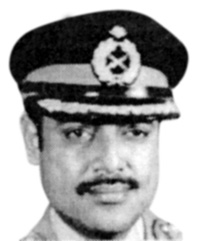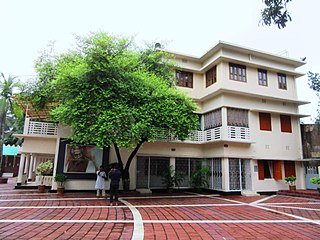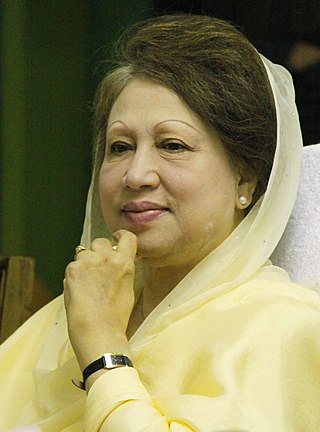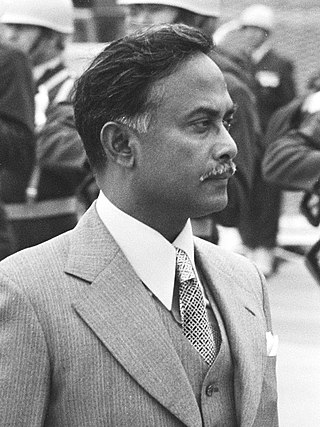
Major General Khaled Mosharraf BU was a Bangladeshi army officer who is known for his role in the Bangladesh Liberation War and the subsequent coups in post-independence Bangladesh. After deposing Khondakar Mustaq Ahmad in the 3 November 1975 coup,Mosharraf was assassinated on 7 November 1975.
Sigma Huda was a Bangladeshi lawyer. She was the founding president of Bangladesh Women Lawyers Association (BNWLA) and founder and secretary of Institute for Law and Development (ILD).

Maulvi Tamizuddin Khan was the Speaker of Pakistan's Constituent Assembly from 1948 to 1954 and National Assembly of Pakistan between 1962 and 1963.
The Bangladesh Freedom Party,also known as Freedom Party is a political party founded by Syed Faruque Rahman,Khandakar Abdur Rashid and Bazlul Huda who were the chief conspirators of the assasination of Sheikh Mujibur Rahman on 15 August 1975.

The Fakhruddin Ahmed ministry was the fourth caretaker ministry in the history of Bangladesh which was formed on 11 January 2007 under the leadership of Chief Adviser Fakhruddin Ahmed. The caretaker ministry was formed on the background of the 2006–2008 Bangladeshi political crisis following a military coup,notoriously nicknamed "1/11" inspired by 9/11,led by General Moeen U Ahmed and the resignation of President Iajuddin Ahmed as the Chief Adviser. Ahmed appointed an team of thirteen advisers to form the government. During his tenure,many high-profile figures,most importantly the two dominant political party leaders Khaleda Zia and Sheikh Hasina,were arrested as part of the emergency government's anticorruption crusade and its attempt to break the women's stranglehold on the country's politics. The attempt was controversially known as the "minus two" formula due to the aim being the exclusion of the two from further political participation.
An interim government led by the Shahabuddin Ahmed ministry was formed on 9 December 1990 in Bangladesh,following President HM Ershad's resignation on 6 December in the face of a mass uprising against his regime. Shahabuddin had taken office as the acting president of the country after he was unanimously agreed upon by the leaders of all political parties to be ceremoniously appointed by Ershad just before resigning as vice-president in place of Moudud Ahmed. He administered the oath of office to his council of advisers at Bangabhaban on 9 December 1990. During this period,he gave back freedom of the press by amending a number of law including the Special Powers Act.

The first Hasina ministry was the government of Bangladesh during the 7th legislative session of the Jatiya Sangsad following the 1996 general election;the 20-minister cabinet was formed on 23 June 1996 and dissolved on 15 July 2001.

Nazmul Huda was a Bangladeshi barrister and politician. He served as the minister of information (1991–1996) and the minister of communications (2001–2006) of the government of Bangladesh. He was a four-term Jatiya Sangsad member representing the Dhaka-1 constituency. He was a member of Bangladesh Nationalist Party since its inception until 2012 when he left the party as its vice chairman.

The Tungipara Sheikh family of Tungipara is one of the two most prominent Bangladeshi political families,other being the Zia family. The family primarily consists of Sheikh Mujibur Rahman,Sheikh Hasina,Sheikh Rehana and their relatives. Their political involvement has traditionally revolved around the Bangladesh Awami League.
Harano Din is a 1961 East Pakistani Bengali-language film directed by Mustafiz and starring Shabnam and Ghulam Mustafa in the lead roles. Mustafiz's brother Ehtesham produced the movie. Ferdousi Rahman crooned the evergreen hit song "Ami Rupnagarer Rajkanya",composed by Robin Ghosh.

The first Khaleda ministry was the government of Bangladesh during the 5th and 6th legislative sessions of the Jatiya Sangsad following the 1991 Bangladeshi general election. It began on 20 March 1991 and but had to be sworn in again on 19 September after the 12th constitutional amendment took effect following a constitutional referendum. In accordance to the amendment,all executive powers were transferred from the president to the prime minister and thus Khaleda Zia became the first female head of government of Bangladesh. The council of ministers was dissolved on 31 March 1996,when a constitutional non-partisan interim caretaker government system was introduced for the holding of general elections after the February 1996 general election conducted by the ministry was boycotted by most of the opposition.

The Ziaur Rahman ministry was the second democratically elected Council of Ministers of Bangladesh during the 2nd legislative session of the Jatiya Sangsad. It was initially formed with members of a provisional council of ministers on 29 June 1978,and with members elected to the reconvened parliament the following year on 15 April,a few days after the martial law promulgated since the August 1975 coup was finally withdrawn following a general election in February. The ministry served under the directly elected President Ziaur Rahman and,after his assassination,his acting president Abdus Sattar. It was dissolved by Sattar after he won the snap presidential election in November and declared a new council of ministers.
Mizanur Rahman Bhuiyan was a justice on the High Court Division of Bangladesh Supreme Court.

The Sayem ministry led what eventually became the first interim government in independent Bangladesh and an unofficial model for future interim regimes. It was formed on 8 November 1975,following the assassination of Brig. Gen. Khaled Mosharraf on 7 November amid a nationwide soldier and public uprising against his 3 November coup d'état. After a three-day coup with support of some high-ranking officers and his Dhaka Brigade,Mosharraf had forced Khondaker Mostaq Ahmad,who,following the 15 August coup that assassinated the founding president Sheikh Mujibur Rahman,replaced him as President of Bangladesh with support of the mid-ranking assassin officers,to resign. Chief Justice Sayem,with the constitutional requirement for the direct election of the president and role of the vice-president as acting president suspended by Mostaq under a martial law proclamation,had been installed in his place. With Mosharraf's death the responsibility of CMLA fell on Sayem.
Colonel (retd.) Md. Masudul Haq was a Bangladeshi Army officer and an adviser for the labor ministry in the advisory council of presidents Abu Sadat Mohammad Sayem and Major General Ziaur Rahman until 1977.
Fasihuddin Mahtab,also spelt Fashiuddin Mahtab,was a Bangladeshi researcher,social worker and the secretary-general of BIRDEM and Diabetic Association of Bangladesh,as well as a member of President Ziaur Rahman's advisory council and later technocrat minister. He was also the son-in-law of BIRDEM founder Muhammad Ibrahim,who was also a member of the advisory council.
Ashfaque Hossain Khan was an adviser for the petroleum ministry,today the Ministry of Power,Energy and Mineral Resources,in the advisory council of President Ziaur Rahman.








